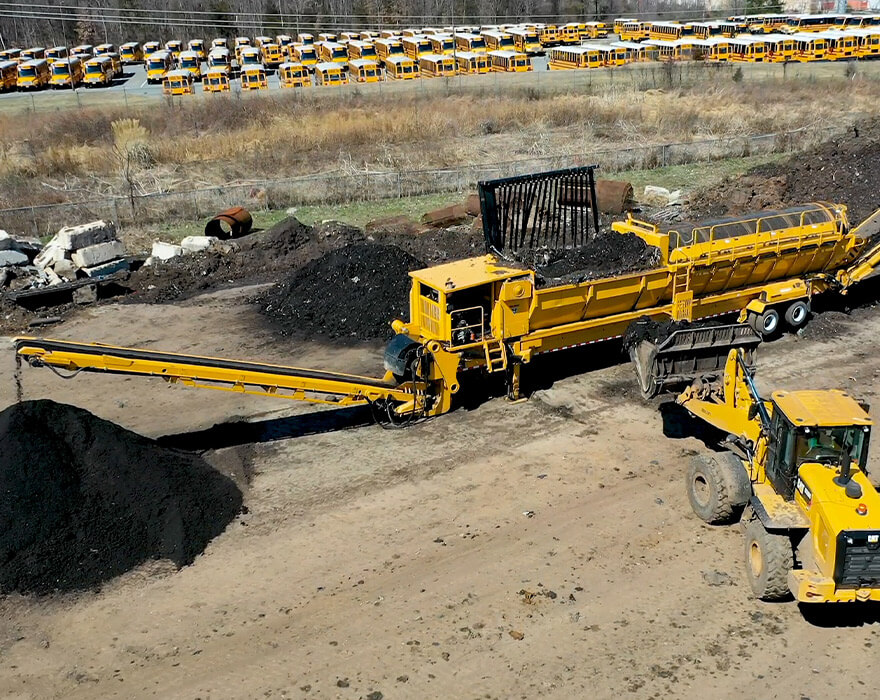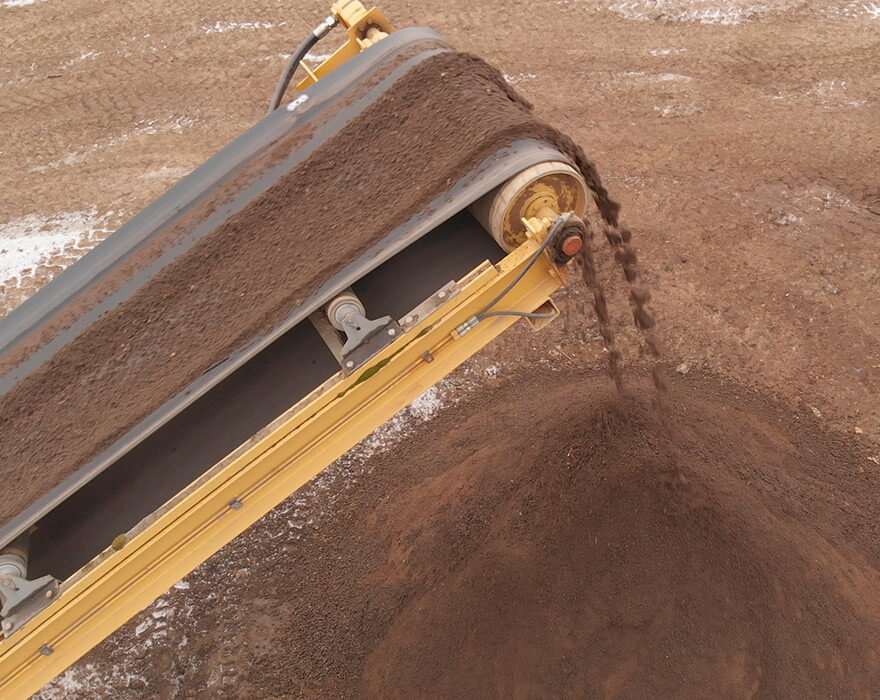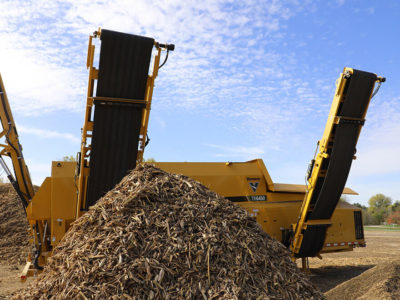Landscaping material producers know how challenging it can be to churn out quality end products like mulch, compost, soil blends and aggregates. In many cases, what separates average producers from those who excel can be summarized in one word: screening. Producers who scrutinize sizing consistency and source material can create compost and soil blends that will have customers lining up to purchase. At the same time, producers who do the bare minimum are forced to rely on tip fees as a primary income source.
“Some landscaping material producers have a hard time justifying adding a trommel screen to their operations because it feels like they’re adding an extra step to their process,” said Ted Dirkx, sales manager for Recycling and Forestry equipment at Vermeer. “This can be a very short-sighted view. In addition to producing high quality materials, screening has several additional benefits, ranging from making the composting process more efficient, to producing a wider range of end products and supporting business growth.”
So, what may feel like an extra step in your company’s production process can be a benefit. Here are four benefits of screening landscape materials and why you should consider screening organic materials at your facility.
1. Helps minimize compost times
Compost is one of the fastest-growing markets for landscaping material supply companies. According to the Compost Research and Education Foundation, soil health and productivity are dependent on organic material — the essence of compost — to provide aeration and sustenance for biological diversity. Furthermore, compost is an environmentally friendly, effective alternative to chemical fertilizers, and can be used for everything from growing crops to maintaining healthy-looking turf.
The challenge many producers struggle with is consistently producing compost to keep up with customers’ needs. “Organic material can take a long time to break down, especially to the sizing preferred for planting and spreading for turf growth,” explained Dirkx. “The windrows or stacked piles have small fines in them, but the material needs to be screened to separate them. Using a screener like the Vermeer TR5300, TR521, TR6400, TR6450 or TR626 trommel screens gives producers an efficient way to pull out that finer material for retail. They can then either add the chunkier material back into the composting piles or sell it for use in other markets where sizing isn’t as much of a concern, like row crop farming.”

Operated by Freestate Farms LLC, the Balls Ford Road Composting Facility in Manassas, Virginia, gets incoming material that’s comprised mainly of yard waste like grass, leaves and tree limbs, and some food waste. The material gets run through their grinder, then stacked into windrows and regularly turned to allow adequate oxygen levels — a process that usually takes between six and eight months. After that, they screen off the larger material, leaving nutrient-rich compost and soils that are used by growers and consumers. The larger material is then turned into nutrient-dense mulch or added back into the composting piles.
“Screening takes time and is often viewed as a bottleneck in the composting process, but it doesn’t have to be that way,” explained Jeffery Morton, operations manager for Freestate Farms. “After trying several models of trommel screens on the market, we discovered that the Vermeer TR626 was the right fit for our operations. It’s convenient to operate and consistently produces, no matter what the moisture content is outside.”
Case study: Freestate Farms
2. Helps produce high-quality end products
Compost isn’t the only application you should consider using screening equipment for. Like the Freestate Farms example above, employing a screener can help you produce high-quality material, whether it’s compost or mulch, soils or aggregates. For those types of landscaping material, customers strongly prefer consistency in product sizing.
Dirkx said he’s visited many facilities that use Vermeer trommel screens to create high-quality topsoils and landscape rock, and even to screen milled asphalt for reuse. “It doesn’t matter whether producers are bagging their end products or selling in bulk, sizing inconsistency or mixed-in contaminates reflect poorly on the producer — and could impact future sales,” he said.
Pine Products in Waconia, Minnesota, is a full-service landscape supply company that uses Vermeer tub grinders and trommel screens to produce mulch from all the wood waste it collects. Pine Products’ process usually includes regrinding material to size it for whatever they need to produce. Then they screen ground products through Vermeer TR626 trommel screens. This process removes fines and dirt for a desirable end product.
“We’ve really honed the process to make a better product faster,” said Ben Dubbe, president of Pine Products. “It makes a big difference in our operational efficiencies to control costs and increase customer satisfaction.”
Case study: Pine Products
3. Helps create soil blends
Developing proprietary soil blends is one way you can further set yourself apart from competitors and obtain more customers. You can combine topsoils with compost and other organic material like sand to create blends that promote plant growth for gardening or as topdressing.
“Most landscaping material producers create soil blends that work tremendously well in their geographical area — something that can’t be purchased at a big box store,” said Dirkx. “In many cases, seeing just how well these blends promote plant growth is often the best marketing they can do to attract new customers. And they can usually charge a premium for these end products.”
Cowart Inc. is a large provider of high-quality composts, mulches and tree care services for the Southeast region of the United States. They have operations throughout the area, and their soil blends are among the most popular end products. Cowart uses trommel screens to separate the compost into three different main blends. Those blends are then bagged and distributed through retailers.
Cowart allows bulk customers to customize their mix ratio and currently produces around 400 different blends. “Most of our customers know exactly what they want, and we blend it accordingly,” said owner Chris Cowart.
Case study: Cowart Inc.
4. Supports business growth plans
Another important reason you should consider adding screening equipment to your landscaping material operations is business growth. You’ve read about how screening equipment can help you produce more and high-quality end products and minimize compost curing times. But at the heart of all these benefits is how it can help your business achieve its growth goals.
“Many producers have reported to me that adding a trommel screen has been a game-changer for their business,” said Dirkx. “They used to struggle with selling, and in some cases would give away the material they were producing. With the addition of a trommel screen, they report that their end products are often sold before they’re produced, freeing them up to take in even more organic material for processing.”

Joyce Landscaping Inc. in Cape Cod, Massachusetts, has been running a Vermeer trommel screen since 2011 to help process and produce its own landscaping material. “We bring in raw materials from jobsites, screen them and take them back to other jobsites,” said owner Christopher Joyce. “We need tens of thousands of yards of material each year, and this machine allows us to prep for landscaping jobs better. We’re not paying to get rid of these raw materials since we’re processing them ourselves, and we don’t have to go out and buy finished, screened loam in the marketplace.”
The trommel screen has not only made Joyce Landscaping a more efficient operation, it’s also added a “green” component to the company’s work, a high priority for Joyce. Producing his own screened loam has helped him recycle and reuse materials he’d otherwise pay to dispose of differently.
Case study: Joyce Landscaping, Inc.
There are many reasons you should consider using screening equipment at your landscaping material supply facility. Contact your local Vermeer dealer for help determining the best Vermeer trommel screen model for your operations.
This article contains third-party observations, advice or experiences that do not necessarily reflect the opinions of Vermeer Corporation, its affiliates or its dealers. Testimonials and/or endorsements by customers in specific circumstances may not be representative of normal circumstances experienced by all customers.
Vermeer Corporation reserves the right to make changes in product engineering, design and specifications; add improvements; or discontinue manufacturing or distribution at any time without notice or obligation. Equipment shown is for illustrative purposes only and may display optional accessories or components specific to their global region. Please contact your local Vermeer dealer for more information on machine specifications.
Vermeer and the Vermeer logo are trademarks of Vermeer Manufacturing Company in the U.S. and/or other countries. © 2022 Vermeer Corporation. All Rights Reserved.
